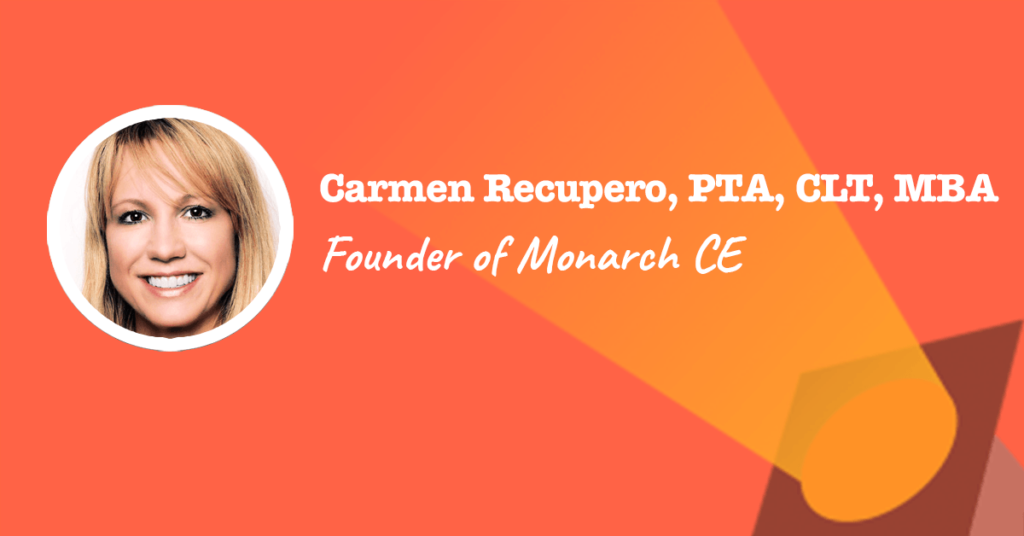This week’s spotlight features Carmen Recupero, a physical therapist assistant whose love of PT—and passion for solving problems—led her to a fascinating career in entrepreneurship and continuing education, forming Monarch Continuing Education!
This post may contain affiliate links or codes. This won’t increase your cost, but it helps keep TNCPT alive, and free of annoying ads! Thank you for your support. 🙂
What is your full name and title at your current job?
Carmen Recupero, PTA, CLT, MBA
As far as my job goes, I am an entrepreneur with a few different jobs/business ventures.
For the last 10 years, I’ve been the owner/operator of Monarch Continuing Education, a company focused on providing lymphedema and oncology courses for PT/PTAs, OT/As, SLP professionals, and nurses. I also have lots of non-clinical courses on my site!
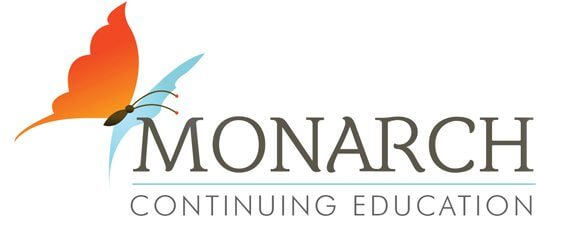
I also run Lymphatic Care Specialists, a company that provides lymphatic care, garment fitting, and medical device consulting in the lymphatic and oncology realm.
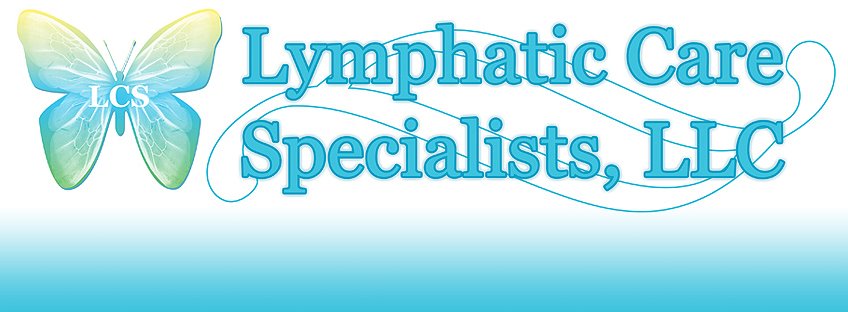
Wow, that is a lot on your plate! What are your hobbies?
Funny you should ask! My husband and I run Meraki Operations, which offers HR and back-end operations support for small businesses and startups that may not have the capacity to have a full-time HR person, full-time financial analyst, or full-time cyber security specialist. We contract these services for them, and this business also houses my business coaching certification course. It’s a business, but for me, it’s more of a hobby!
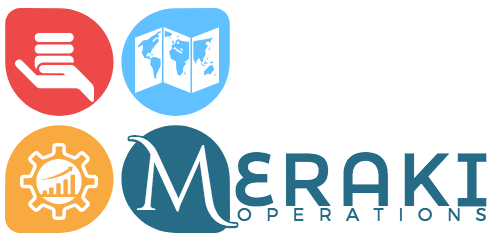
Where did you go to PTA school, and what year did you graduate?
I went to school at Jefferson College of Health Sciences in Roanoke, VA in 1994, when I was 20 years old. I knew from an early age (7th grade) that I wanted to go into physical therapy.
What did you do when you first finished school, and for how long?
I chose to do the two year program because I knew I wanted to go into physical therapy and have hands on care with the patients and didn’t want a lot of paperwork. I knew I did not want to go to PT school. Immediately did outpatient therapy and then transitioned to pediatrics for about 6 months. From there I moved to long term care and geriatrics for 15 or so years.
What did you enjoy about your early roles? What didn’t you enjoy?
I enjoyed exploring and learning about the different types of clinical settings. I loved geriatrics because it still allowed me to do some orthopedic and some neurological care and a broad variety of clinical care—all within one setting.
At what point did you realize you wanted to do something else, and why?
In 2004, I stumbled across lymphatic therapy and a lymphedema course. It intrigued me so much that I became fully certified. It was at that time I became a certified lymphedema therapist, and its been the most pivotal certification of my 25-year career.
How so?
I began treating patients in the lymphedema field, and there was such a shortage of therapists that I had people coming from four hours away—and I still had a waiting list.
I realized the only way to extend lymphedema care to more people was to train more therapists.
This evolved into me teaching an introduction to lymphedema course, which became a full certification program, which was recognized and accredited in 2010. We are one of only seven programs to certify allied health professionals in the field of lymphedema in the US.
How has your role evolved to what you are doing now?
I still run the continuing education business, and I have multiple instructors teaching all over the US and overseas. I am also performing medical device consulting in the field of lymphedema and oncology care.
I also work in a less hands-on role with Meraki operations with a business partner.
Are you still treating patients, or are you solely non-clinical?
I am 95% non-clinical, but I still like to keep my fingers on the pulse of patient needs and keep in touch with patients.
I also stay in touch with patients in my community so they can come volunteer and help therapists during the education component of the certification course. They come to the clinic for free lymphedema treatments.
I still want to keep my skills up by doing some compression garment fitting and some lymphedema care.
How would you define your role and your career?
My role is always evolving and growing. My businesses are always evolving and growing. If I see a need, I develop a business model around that—and that works for me.
I have been in the continuing education business since 2010, and the lymphatic care specialists program since 2006. Meraki, just in the last two years, has expanded and grown quite a bit.
I create my own jobs. All of my non-clinical ventures have been my own creation. I don’t wait for someone to find me, if i see a need in the community of rehabilitation I create and market a job for myself.
How has your unconventional career path affected things like your resume and LinkedIn profile?
I do tailor my resume and cover letter based on the ventures and contracts I want to land for consulting. Remember, your LinkedIn profile should reflect what you want to do next. Your resume should reflect what you have done, LinkedIn should show what you are interested in doing in the future.
Did you get any special certifications or training along the way to help you get into your current role?
YES – As I mentioned, I got a lymphedema therapist certification. I also got a certified executive coaching certification, and I went back to school and got my MBA at UVA Darden School of Business. I also have a massage therapy certification.
Wow! What led you to go that route?
Some physicians have reached out a number of times over the years, and they continue to send patients in hopes that I would see them. Because of this, I went back and got my massage therapy certification to have a license and broader coverage for liability. I wanted that extra liability and coverage for touch for when I was providing lymphatic care if I decided to do so in our free clinic (or when working with Medicaid patients).
I’d love to hear more about the free clinic…
This all started because a clinic where I worked at one point didn’t accept free patients or Medicaid-insured patients, so I didn’t have the license to touch them. Nor did I have any liability insurance that would cover me. So, I obtained my MT which is a broader certification which also allows me to accept private-pay patients. This has also worked out to be the most fruitful for leaving the insurance billing realm for physical therapy.
What made you decide to get the MBA?
I worked on my own for seven years as an entrepreneur before I went back to school to obtain my executive MBA. The program was extremely intense and challenging, but I found it most worthwhile. That’s because I will have lifelong connections and experiences to take away from that.
What’s a typical day in the life like at Monarch Continuing Education?
My week is very full, with working 10-12 hours per day. Most of that is on a laptop or conference calls, where I can walk outside or I can work from home. This is convenient for when I am not traveling or teaching.
This lifestyle offers an extreme amount of flexibility, but it is also very intense and time-consuming. If you want to be an entrepreneur, you need to be very focused, with excellent time management—mainly so you can meet deadlines on your own without someone telling you what to do.
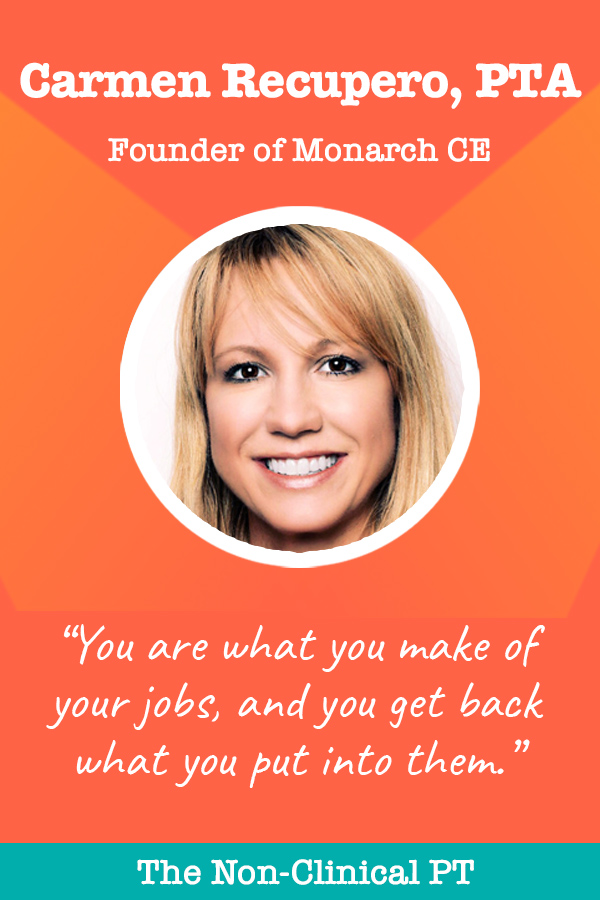
What are some of the challenges of your role? What are the rewards?
Challenges—You are in charge of your own destiny. You are what you make of your jobs, and you get back what you put into them. This is probably a reward for some, but can also be a challenge for many!
Rewards—Its a flexible schedule. When my kids were young, the flexible schedule was of utmost importance. Working from home is hard for friends and family to understand sometimes. They don’t realized that, yes, you ARE working…and that you can’t talk all day long or help with other responsibilities.
Sometimes, people don’t realize that working from home often means that your work is equally intense as an on-site role.
How do you think working as a PTA prepared you for entrepreneurship? Which skills transferred?
I use my clinical skills every day. Whether it is consulting with a patient or working with a physician to discuss products used by our patients, my clinical skills are fundamental to the work I do.
Roughly speaking, how are the hours and pay compared to patient care?
I make roughly double what I did when I was in patient care (on an hourly basis).
Do you work remotely or on-site?
Almost entirely remotely
Does your organization hire PT, OT, or SLP professionals into non-clinical roles?
Yes, we are always hiring for non-clinical roles—everything from administrative to clinical research assistants. We also hire clinical research coordinators for the medical devices and the oncology and rehabilitation fields.
Do Monarch CE or Meraki Operations offer any outside-the-box coursework you’d like to discuss?
Yes! We have a whole host of non-clinical CEUs available. You can see the full list here. Here are a few of the topics we cover.
- Healthcare leadership series
- Telehealth
- Business coaching certificate
What is next for you? What do you want to do with your career long-term?
I will continue to grow and evolve. I always keep my eyes and ears open for new opportunities. I am always presented with new opportunities because I am always open to ideas and problems to solve. I can help bring solutions to these problems, and it is what I love doing.
What would you like to change most in your profession, and why? How would you propose doing so?
I certainly would put some restraints on the for-profit companies that are in skilled nursing facilities. The strenuous and ridiculous productivity standards for our therapists are completely unrealistic and not beneficial for the patients at all.
Want to be an entrepreneur?
Learn to build, grow, and monetize a blog based on your existing rehab experience and skills!


